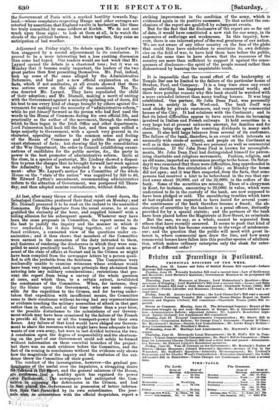It is impossible that the moral effect of the bankruptcy
at Temple Bar can be limited to the failure of the particular house of Strahan, Paul, and Company. It is a long time since any event equally startling has happened in the commercial world; and there were peculiar reasons why this bank should be watched with a more extended interest than many trading houses. It was long established. One partner, Sir John Dean Paul, was personally known to society in the West-end. The bank itself was used chiefly by private customers, and very little by commercial houses of the City. It had relations with the Continent ; and in fact its latest difficulties appear to have arisen from its becoming involved in Italian and French railways. It held securities to a very large but at present unknown amount, for families and for charities; being the agent for receiving dividends in many such cases. It also held large balances from several of its customers. The failure of the bank, therefore, is an event which interests an unusually wide circle of society, and people on the Continent as well as in this country. There are personal as well as commercial associations. If Sir John Dean Paul is known for accomplish- ments, Mr. John Dean Paul had distinguished himself for patron- izing charitable and religious movements. Fashion, religion, and an old name, imparted an uncommon prestige to the house. On Satur- day it was rumoured that there were difficulties, long apprehended in the City from the free circulation of bills ; on Monday the house did not open; and it was then suspected, from the facts, that some persons had received a hint to be beforehand in the run that car- ried away about 20,0001. out of the 22,000/. in the coffers of the bank. Some of the securities are missing. Those of a clergyman in Kent, for instance, amounting to 22,0001. in value, which were understood to lie in the custody of the bank, are now supposed to have been pledged or sold. The smouldering troubles which have at last exploded are suspected to have lasted for several years the continuance of the bank therefore became a fraud; the ab- straction of securities by the bankers is a penal offence, distinctly provided for by a special statute; and the partners of the bank have been placed before the Magistrate at Bow Street,'as criminals. But the case, we say, as a whole, cannot be separated from others that have recently occurred. It seems to push that kind of fast trading which has become common to the verge of misdemean- our; and the question that the public will moot with great in- terest is, where commercial men draw the line, and how many commercial houses have fallen into this peculiar species of adultera- tion, which makes ordinary enterprise only the cloak for enter- prise of a different order?


































 Previous page
Previous page